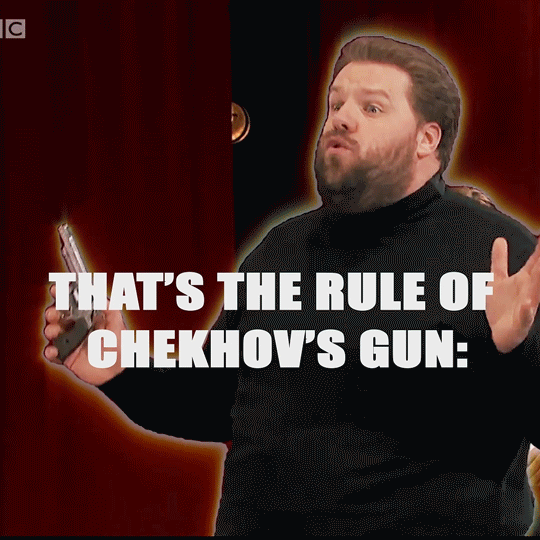A topic that came up on Discord this past week that I felt warranted some more in-depth discussion: how do you handle unhelpful dice results? This comes up many different forms, and this is by no means an exhaustive list, but a couple of examples to consider:
- The roll is too good at something that should be more of a challenge
- The roll goes poorly at something that should be easy
- The roll is moderate and doesn’t really give you a strong way to go to develop the story
- The player is doing something you hadn’t prepared for that may or may not be relevant to the plot, and the result is in the extremes, so you need to come up with some sort of significance to it
These are problems that affect any RPG involving dice, though with the system 1879 uses, there are a few other nuances to consider since the dice system is open ended. No two situations are going to be exactly alike, and there are a lot of factors to consider, some of which may have further ramifications down the road that you may not have time to consider in the heat of the moment. Dealing with these situations gracefully and strategically is a skill that only time and experience can really develop for a GM, but we can go over a couple of these general situation and provide some suggestions you might use.
Before getting too far in, a point I want to make clear for any newer GMs out there, or maybe ones that just aren’t that confident in their abilities: it’s okay if you make a mistake. Yes, when you are the GM, you’re the master overseeing the universe that your players are taking part in; you call the shots, you decide which rules do and do not apply and how, you have complete control over everything.

It’s a powerful feeling, but it can also be overwhelming. The simple fact is, we’re all human, and you’re going to make a mistake at some point. You’ll make a ruling in the heat of the moment without considering long term ramifications, you’ll put a lot of effort into a story element that the players don’t follow or simply don’t care about, or you might just have an off day. That’s all okay. Sometimes those mistakes can be covered up or worked around without long term ramifications, sometimes you need to just own up to the mistake with your players and either retcon it or sweep it under the rug. Heck, sometimes those mistakes can end up taking on a new life and becoming story elements in and of themselves (just as with player mistakes), so don’t run away from them, embrace your fallibility. The important thing is to keep open communication with your players, be as consistent as possible, and if that consistency needs to change, have a clear reason as to why and explain that to your players.
With all that out of the way, let’s take a look at the first of the situations I pointed to on the list (and the main one that inspired the post): the roll is too good. This can come out in a couple of different forms, such as sidestepping obstacles that prevent encounters and interesting story elements from coming about, overcoming something that should have been a challenge that required a concentrated group effort or a plot device that moves things ahead too quickly, an exploding damage roll that kills off an NPC that was important for later, and so on.
First, it is important to recognize that a significantly good roll should get some sort of a reward. Dice are what keep the elements of random chance in the game, and as such those moments should be kept interesting. You want your players to stay excited as much as possible whenever they roll their dice, as these are the moments where the story can go directions that no one is able to predict. If a player gets a really good die result but has nothing to show for it, even if it’s for a mundane activity, it lessens that sense of excitement in the future (and incidentally is a case for not rolling dice when the situation isn’t important enough to call for it, but that’s another topic all on its own).
So, what can you do about it? One of the suggestions I mentioned on the topic on Discord that brought this up is to consider that the reward they get for the high roll may not be a simple and direct avoidance to an issue or solution to a problem. In the example there, the players were rolling Navigation to try and avoid obstacles en route to their destination. Very often, however, danger simply can’t be avoided. This is true both from a realism standpoint and from a story telling standpoint to keep the world interesting. However, rolling well in this situation could grant them additional information and allow them to make a choice. Say you’re trying to navigate to Edinburgh to see Lord MacGuffin and try to convince him to hand over the Diegesis device his family has been guarding for generations that you need to solve your next problem. Suitable high rolls could simply find you a direct train that will take you straight to him. But where’s the fun in that? Instead, take that high roll and give the players a choice. You do find a train that’s headed there directly, but your high roll means you did some additional sniffing around and found out that it’s also pulling some very high end cargo that’s likely to result in a bandit attack on the train. There’s also a cargo train headed that direction that will probably have a quiet ride, but you’d have to either do some convincing to be allowed to ride on or try and stow yourselves away and face the potential legal ramifications if you’re caught. Both of these situations have a potential for danger and excitement, and more importantly, the player still gets their reward for the good roll by getting not only the information on the potential hazards, but the opportunity to choose which option they want to pursue.
There’s also the classic “Yes, but…” complication you can throw in. The players get to succeed, but success comes at a price that might make things messy for them later. This can also be used when dealing with failed die results for a critical situation that has to move the plot forward (and we’ll get to that later), but needs some different considerations when applying it to an over success. In particular, when using this for an over success, it has to be navigated carefully and should be used sparingly, so that you’re not making the players feel cheated out of success. The idea is not to punish them for succeeding, but having things go a little too well creating an extra complication that they have to work around. Say for example you’ve got a group doing a dodge and trying to break into the Engine room. The door to the room has a bracer bar that gets locked securely, and you intended for them to have to stealth around to get a key off of one of the guards. Instead, the group’s muscle character decides to brute force the lock open with a prybar and gets an excessively high strength roll to do so. You might say that the sound of the lock breaking has alerted the guards, and though the door is now accessible, that also means you can’t use the lock again to secure it. If you really don’t want to seem like you’re punishing the characters, you could have one of them notice that some of the lock pieces have broken into a wedge shape that they could jam under the door to secure it in place, but that would mean they can’t use it to leave and will have to find another way out once they’re done. The idea is to take the success that otherwise would have circumvented the plot and simply making it go another direction.

Also bear in mind that not always do the results of success have to come into play immediately, and this can be particularly true of an overachieving success. A delayed reward can often enhance the feelings of gratification for it, because the time can build up the anticipation. It’s also gives you time to sort out what the heck you want to do with the result, and gives you a handy tool to keep in your back pocket if the players happen to get stuck later. The downside is that you have to keep track of it and find the proper moment to bring it up, and you don’t want it to go too long or the players will have lost interest; they often are an impatient lot.

Again, it’s one that’s best to use sparingly, and will probably be a technique you want to use either within the same game session or the very next one, but if employed effectively, it can really enhance the story. For the example here, let’s say your players are prepping for an expedition to a Babylonia archeological site, looking for some sort of secrets or knowledge that might be used now as a tool in the war effort against the Samsut. Your players head over to the library to do some research on their architecture and design to give them an edge in looking for hidden rooms and such, and one of the players gets a massively good roll. In addition to achieving their initial goal, you might also toss in that they get distracted in fascination for a while reading about another subject like their agriculture and irrigation systems. Seems unimportant now, and the player will probably forget that you mentioned it soon after. Later on when they get to the location and the group is looking for hidden sites, you tell that player they notice something looks off with how the irrigation channels are set up, that the flow of the water seems to have been taken out of its way to go around something, and maybe they should go look in the area where it would have gone more naturally. In essence, you’ve used the earlier success to set up a Chekhov’s Gun scenario. You don’t have to know exactly how the seemingly mundane plot element from the success is going to apply down the road, and you don’t always have to define it as exactly as I did in the example here, but as long as you keep track of it, you can bring it out whenever the moment is appropriate.

This is by no means an exhaustive list, nor really can it be, as there are an infinite number of ways this problem could arise and an infinite number of ways to resolve it. The point here is just to give you a couple of examples and some ways to resolve them that might not be quite so immediately obvious. Since this subject is so broad, I’m going to break this one up into a multi-part series and discuss the other bullet points I mentioned earlier in their own posts (and no, I didn’t plan that at the beginning; see how I brought it back with the last example?).
Do you have some other ideas on how to deal with a runaway success on a die result? Have you played in a game and had one that turned into a particularly epic moment in the story? Let us know on Discord, and we’ll see you next week!

One thought on “1879: They See Me Rollin’ (Dice), Part 1: Suffering From Success”
Comments are closed.